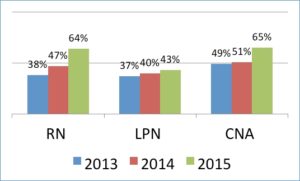By Elizabeth Hilla, Senior Vice President
Want to Get a Customer Talking? Ask About Staffing Challenges.
An enormous part of your value as a distributor is saving staff time. When healthcare customers get reliable distribution services, they spend less time ordering, receiving, managing, and paying for medical supplies. What’s more, a trusted distributor rep can help providers choose time-saving products and train clinical staff to use those products correctly and efficiently.
You know that. But more than ever, I recommend making this a key topic in your customer conversations.
Why staffing is a pain point
In many places across the U.S., particularly rural areas, there just aren’t enough healthcare workers. Greater access to health insurance, combined with an aging population, is driving increased demand for healthcare services. Unfortunately, the supply of registered nurses (RNs), certified nurse assistants (CNAs), and other workers just isn’t keeping up.
What’s more, employee turnover is high in healthcare settings – after all, nurses and other workers have demanding, physical jobs. If they see the opportunity to move to a different facility for higher pay or less stress, they are likely to take it.
If you call on nursing homes or home health agencies, the problem is likely to be even worse. On a recent HIDA AMS webinar, Chris Boldt, Vice President of Long-Term Care Operations for Benedictine Health System, reported the annual turnover rate for both RNs and CNAs in nursing facilities in her state was well over 60 percent. Some positions stay open for weeks or months simply because there are no applicants. When attending meetings with other long-term care leaders, “we have a lot of dialogue across the country around how do we address the vacancy issue in long-term care,” Boldt said.
Nursing Facility Staff Turnover
 Source: Long Term Care Imperative 2016 Legislative Survey (Minnesota)
Source: Long Term Care Imperative 2016 Legislative Survey (Minnesota)
The problem isn’t likely to improve any time soon. More than half the RNs in the U.S. are over age 55, meaning more nurses are retiring than entering the workforce. What’s more, the problem tends to compound itself: understaffing adds to stress and dissatisfaction for the remaining workers, which can lead them to leave the profession.
How can you turn this into an opportunity?
 Because this issue is likely to be top-of-mind with many customers, it won’t be hard to start a conversation about staffing. I recommend simply asking your contact about their pain. For instance:
Because this issue is likely to be top-of-mind with many customers, it won’t be hard to start a conversation about staffing. I recommend simply asking your contact about their pain. For instance:
“Carla, I heard on a HIDA webinar recently that the turnover rate for nurses in some areas is more than 60 percent. Is that a big problem here? What are you doing about it?”
If you confirm that staffing is a major pain point, you likely have a host of solutions in your portfolio that may be relevant, such as:
- Quick and easy-to-use rapid tests: Anything that involves a time savings for the clinician, or reduces a step, is likely to be valued.
- Inventory management programs: Show customers how you can take non-clinical work away from nurses, through solutions such as low-unit-of-measure programs, Kanban systems, or other programs.
- Patient lift devices: Because nurses often have to move and lift patients, back injuries are common, and take nurses out of the work force, at least temporarily. Many facilities are now using various kinds of patient lifts to prevent these injuries. If your customer isn’t, this is a great sales opportunity.
- Incontinence or skin and wound care products: If your product saves steps, reduces the number of changes, or decreases the likelihood of time-consuming complications, talk about those benefits.
- In-service training: High turnover means your customers have an ongoing need for staff training, especially if you can make it quick, simple, and available on short notice as new workers are hired.
Finally, anything that makes staff members a little happier in their jobs is extremely valuable. For example, Boldt recommends asking not just the RNs for their input on your products, but also the CNAs. “As we go through the pecking order, often those CNAs unfortunately do not feel valued for the great and demanding work they do with our patients,” said Boldt. Including them in the product evaluation process can make these key staff members feel more valued, and the supplier receives valuable feedback on products as well, she noted.
| For more resources on building your sales skills, check out HIDA’s AMS Sales Training Program. For information, contact Elizabeth Hilla, 703-838-6130, hilla@hida.org. |

